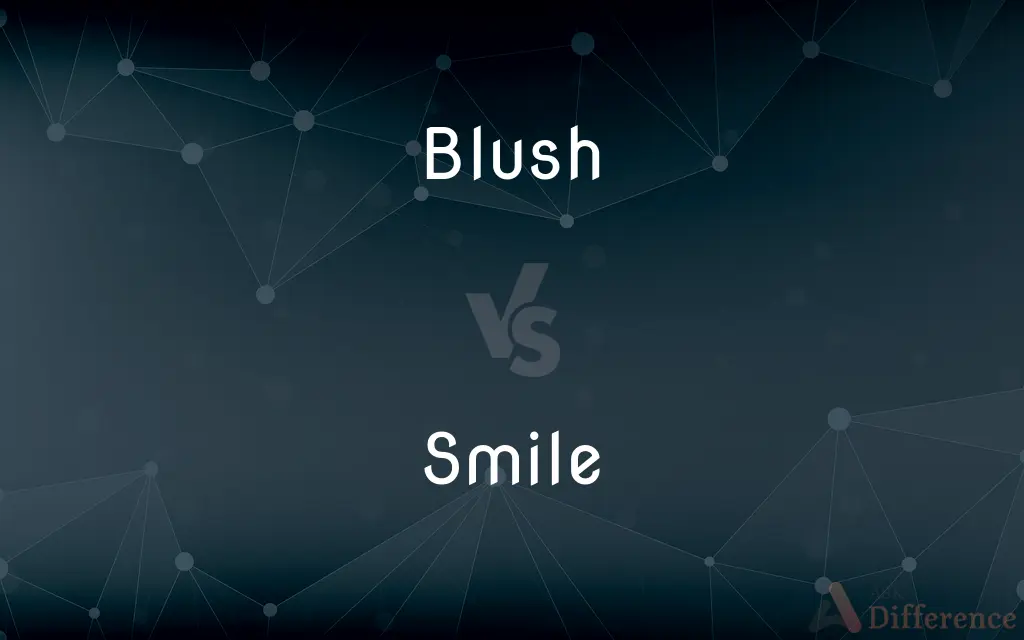Blush vs. Smile — What's the Difference?
By Maham Liaqat & Urooj Arif — Updated on April 26, 2024
Blush is a physical reaction causing redness in the face due to emotional triggers, while a smile is a facial expression of happiness or friendliness.

Difference Between Blush and Smile
Table of Contents
ADVERTISEMENT
Key Differences
Blushing is an involuntary physiological response that typically signifies embarrassment, shyness, or emotional stress, causing redness to appear on one's cheeks. On the other hand, smiling is a voluntary or involuntary expression that involves the upward movement of the lips, often indicating happiness, approval, or sociability. Both are non-verbal cues but serve different emotional and communicative functions.
While blushing often reveals a person's discomfort or emotional vulnerability, it can also be a sign of excitement or affection. In contrast, smiling generally conveys confidence and openness, and it can be used strategically in social interactions to put others at ease or show agreement.
Blushes are triggered by emotional stimuli and are less controllable, directly linked to the sympathetic nervous system. Whereas, smiles can be both spontaneous and controlled, involving specific facial muscles, and can be used to mask true feelings or enhance social bonds.
In terms of social perception, blushing may be interpreted as a sign of honesty and modesty, as it is difficult to fake. Conversely, smiles, while typically seen as a sign of friendliness, can sometimes be perceived as insincere if not matched by the eyes and other facial expressions (the "Duchenne smile" being the genuine form).
Blushing is usually associated with negative emotions like embarrassment, but it can also enhance social trust by displaying emotional authenticity. On the other hand, a smile, especially a genuine one, universally increases likability and fosters positive social interactions.
ADVERTISEMENT
Comparison Chart
Definition
Reddening of the face due to emotional triggers
Facial expression indicating happiness or friendliness
Trigger
Emotional stress, embarrassment
Happiness, friendliness, social cues
Control
Involuntary
Can be both voluntary and involuntary
Emotional Association
Embarrassment, shyness, affection
Happiness, approval, sociability
Social Perception
Sign of honesty, modesty
Indicates openness, can be strategic
Compare with Definitions
Blush
Involuntary facial redness related to emotional responses.
Any mention of the incident made her blush.
Smile
A friendly or polite gesture made by curving the lips upward.
He gave a quick smile as he passed by.
Blush
A reddening of the face as a reaction to feelings of embarrassment or emotional stress.
She began to blush during the awkward conversation.
Smile
A facial expression used to convey emotions positively.
His encouraging smile gave her confidence.
Blush
Sign of emotional vulnerability or honesty.
Her blush revealed her true feelings.
Smile
An expression of happiness with the corners of the mouth turned up.
His smile brightened the room.
Blush
To turn red as a result of an emotional trigger.
He blushed when his crush complimented him.
Smile
To express joy or approval through a facial expression.
She smiled warmly at her friend.
Blush
Physiological response indicating emotional sensitivity.
The unexpected praise made him blush.
Smile
An act of showing pleasure or sociability on one's face.
She couldn't help but smile during the movie.
Blush
Show shyness, embarrassment, or shame by becoming red in the face
Kate felt herself blushing scarlet
She blushed at the unexpected compliment
Smile
A smile is formed primarily by flexing the muscles at the sides of the mouth. Some smiles include a contraction of the muscles at the corner of the eyes, an action known as a Duchenne smile.
Blush
Be or become pink or pale red
The trees are loaded with blushing blossoms
Smile
A facial expression characterized by an upward curving of the corners of the mouth and indicating pleasure, amusement, or derision.
Blush
A reddening of the face as a sign of shyness, embarrassment, or shame
He had brought a faint blush to her cheeks
Smile
To have or form a smile.
Blush
A pink or pale red tinge
The roses were white with a lovely pink blush
Smile
To look with favor or approval
Fortune smiled on our efforts.
Blush
A wine with a slight pink tint made in the manner of white wine but from red grape varieties
Blush Zinfandel
Smile
To express cheerful acceptance or equanimity
We smiled at the bad weather and kept going.
Blush
Another term for blusher (sense 1)
Smile
To express with a smile
Grandmother smiled her consent.
Blush
To become red in the face, especially from modesty, embarrassment, or shame; flush.
Smile
A facial expression comprised by flexing the muscles of both ends of one's mouth, often showing the front teeth, without vocalisation, and in humans is a common involuntary or voluntary expression of happiness, pleasure, amusement, goodwill, or anxiety.
She's got a perfect smile.
He has a sinister smile.
She had a smile on her face.
He always puts a smile on my face.
Blush
To become red or rosy.
Smile
(figurative) Favour; propitious regard.
The smile of the gods
Blush
To feel embarrassed or ashamed
Blushed at his own audacity.
Smile
A drink bought by one person for another.
Blush
A reddening of the face, especially from modesty, embarrassment, or shame.
Smile
(ambitransitive) To have (a smile) on one's face.
When you smile, the whole world smiles with you.
I don't know what he's smiling about.
She smiles a beautiful smile.
Blush
A red or rosy color
The blush of dawn.
Smile
(transitive) To express by smiling.
To smile consent, or a welcome
Blush
A glance, look, or view
Thought the painting genuine at first blush.
Smile
(intransitive) To express amusement, pleasure, or love and kindness.
Blush
Makeup used on the face and especially on the cheekbones to give a usually rosy tint. Also called blusher.
Smile
(intransitive) To look cheerful and joyous; to have an appearance suited to excite joy.
The sun smiled down from a clear summer sky.
Blush
An act of blushing; a red glow on the face caused by shame, modesty, etc.
Smile
(intransitive) To be propitious or favourable; to countenance.
The gods smiled on his labours.
Blush
A glow; a flush of colour, especially pink or red.
Smile
To express amusement, pleasure, moderate joy, or love and kindness, by the features of the face; to laugh silently.
He doth nothing but frown. . . . He hears merry tales and smiles not.
She smiled to see the doughty hero slain.
When last I saw thy young blue eyes, they smiled.
Blush
(figuratively) Feeling or appearance of optimism.
Smile
To express slight contempt by a look implying sarcasm or pity; to sneer.
'T was what I said to Craggs and Child,Who praised my modesty, and smiled.
Blush
A sort of makeup, frequently a powder, used to redden the cheeks.
Smile
To look gay and joyous; to have an appearance suited to excite joy; as, smiling spring; smiling plenty.
The desert smiled,And paradise was opened in the wild.
Blush
A color between pink and cream.
Smile
To be propitious or favorable; to favor; to countenance; - often with on; as, to smile on one's labors.
Blush
A pale pink wine made by removing the dark grape skins at the required point during fermentation.
Smile
To express by a smile; as, to smile consent; to smile a welcome to visitors.
Blush
The collective noun for a group of boys.
A blush of boys.
Smile
To affect in a certain way with a smile.
And sharply smile prevailing folly dead.
Blush
(intransitive) To become red in the face (and sometimes experience an associated feeling of warmth), especially due to shyness, shame, excitement, or embarrassment.
The love scene made him blush to the roots of his hair / to the tips of his ears.
He wasn't used to this much attention, so he blushed as he saw dozens of pairs of eyes watching him.
Smile
The act of smiling; a peculiar change or brightening of the face, which expresses pleasure, moderate joy, mirth, approbation, or kindness; - opposed to frown.
Sweet intercourseOf looks and smiles: for smiles from reason flow.
Blush
To be ashamed or embarrassed (to do something).
Smile
A somewhat similar expression of countenance, indicative of satisfaction combined with malevolent feelings, as contempt, scorn, etc; as, a scornful smile.
Blush
(intransitive) To become red.
Smile
Favor; countenance; propitiousness; as, the smiles of Providence.
Blush
(transitive) To suffuse with a blush; to redden; to make rosy.
Smile
Gay or joyous appearance; as, the smiles of spring.
The brightness of their [the flowers'] smile was gone.
Blush
(copulative) To change skin color in the face (to a particular shade).
When he saw it, he blushed a beet red.
I wasn't surprised, but it was embarrassing enough that I blushed a little pink.
Smile
A facial expression characterized by turning up the corners of the mouth; usually shows pleasure or amusement
Blush
(transitive) To express or make known by blushing.
Looking at me with a knowing glare, she blushed her discomfort with the situation.
Smile
Change one's facial expression by spreading the lips, often to signal pleasure
Blush
(intransitive) To have a warm and delicate colour, like some roses and other flowers.
The garden was full of blossoms that blushed in myriad shades to form a beautiful carpet of color.
Smile
Express with a smile;
She smiled her thanks
Blush
To glance with the eye, cast a glance.
Blush
Of dope or varnish: to develop an undesirable white precipitate on the surface, due to being applied in humid conditions.
Blush
To become suffused with red in the cheeks, as from a sense of shame, modesty, or confusion; to become red from such cause, as the cheeks or face.
To the nuptial bowerI led her blushing like the morn.
In the presence of the shameless and unblushing, the young offender is ashamed to blush.
He would strokeThe head of modest and ingenuous worth,That blushed at its own praise.
Blush
To grow red; to have a red or rosy color.
The sun of heaven, methought, was loth to set,But stayed, and made the western welkin blush.
Blush
To have a warm and delicate color, as some roses and other flowers.
Full many a flower is born to blush unseen.
Blush
To suffuse with a blush; to redden; to make roseate.
To blush and beautify the cheek again.
Blush
To express or make known by blushing.
I'll blush you thanks.
Blush
A suffusion of the cheeks or face with red, as from a sense of shame, confusion, or modesty.
The rosy blush of love.
Blush
A red or reddish color; a rosy tint.
Light's last blushes tinged the distant hills.
Blush
A rosy color (especially in the cheeks) taken as a sign of good health
Blush
Sudden reddening of the face (as from embarrassment or guilt or shame or modesty)
Blush
Turn red, as if in embarrassment or shame;
The girl blushed when a young man whistled as she walked by
Blush
Become rosy or reddish;
Her cheeks blushed in the cold winter air
Common Curiosities
What are the social benefits of a smile?
Smiling can enhance likability, ease social interactions, and convey friendliness.
Can blushing be controlled?
Blushing is typically involuntary, controlled by the sympathetic nervous system.
Is blushing always negative?
Not necessarily; it can also be a sign of excitement or affection and can enhance social trust.
What does a blush indicate in social contexts?
It often indicates honesty, modesty, or embarrassment, reflecting vulnerability.
What causes a person to blush?
Emotional triggers like embarrassment, shyness, or romantic feelings cause blushing.
How can you tell if a smile is genuine?
A genuine smile involves both the mouth and the eyes; the latter crinkle in a "Duchenne smile."
Why do people smile?
People smile to express happiness, sociability, and sometimes to mask their true feelings.
How are blush and smile perceived in different cultures?
Cultural interpretations vary, but generally, blushing is seen as a sign of modesty, and smiling is universally recognized as a sign of happiness or politeness.
Can someone blush and smile at the same time?
Yes, often during mixed emotions like when one is embarrassed but also happy or pleased.
What differentiates a forced smile from a natural one?
A forced smile usually involves just the mouth, while a natural smile also engages the eyes.
Share Your Discovery

Previous Comparison
Faroese vs. Icelandic
Next Comparison
Deadlock vs. StalemateAuthor Spotlight
Written by
Maham LiaqatCo-written by
Urooj ArifUrooj is a skilled content writer at Ask Difference, known for her exceptional ability to simplify complex topics into engaging and informative content. With a passion for research and a flair for clear, concise writing, she consistently delivers articles that resonate with our diverse audience.















































